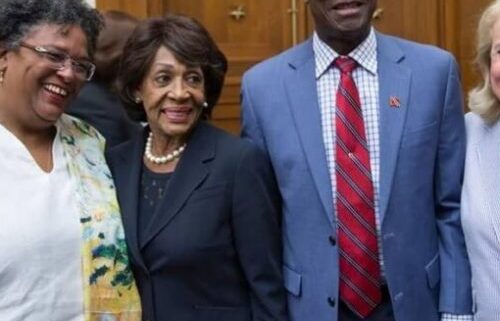Bajan PM tells US financial committee: You’re driving Caricom underground
Black Immigrant Daily News
Prime Minister Dr Keith Rowley with Barbados PM Mia Mottley, left, US congresswoman Maxine Waters, 2nd left, and and US congresswoman Sylvia Garcia on Wednesday at the US Congress. –
BARBADOS Prime Minister Mia Mottley made a plea to the US House of Representatives Committee on Financial Services to stop “driving our (Caribbean) countries underground and making our countries uncompetitive” when it comes to correspondent banking in the region.
She was speaking at a hearing titled When Banks Leave: The Impacts of De-Risking on the Caribbean and Strategies for Ensuring Financial Access.
A correspondent bank refers to one that can provide services to another bank or financial institution in another country.
Mottley told the committee that Caricom has a collective GDP of $82 billion, while “there are 41 states in the US that have a larger GDP than all 15 member states of Caricom. “It is important that we appreciate that context first.”
She said within the last decade, almost every country in the region had a loss of over 30 per cent of their correspondent banking relationships, adding that many continue to use alternative methods.
“We are here because the listing process that has taken place, whether through the Financial Action Task Force (FATF) or the OECD (Organisation for Economic Co-operation and Development) or further as a result of actions taken for enhanced due diligence by those who take the listings from the FATF and OECD.
“It means that those correspondent banks, over the course of the last ten to 12 years, have made a judgment that we are simply too small, as I’ve just told you, in order to get involved because the enhanced due diligence means increased cost of regulation, increased cost of compliance. And rather than do business with us, they say, ‘Thank you but no thank you.’”
A DECADE OF
CARICOM NOISE
She said owing to this decision, while the US sought to avoid terrorism financing and money laundering, “It is likely to happen because you are driving people underground.
“There is no benefit in driving our countries underground or making our countries uncompetitive such that our economies are at risk of becoming underdeveloped or failed states.”
She said Caricom has been “making noise” on this issue for almost a decade, thanking the committee as “that noise cannot continue.”
“There are options becoming available to countries to opt out of the SWIFT system and find other ways of being able to transmit money to their citizens.
“For us in this region, it is not yet here but, given long enough, nature abhors a vacuum and we will find a way.”
She said this should matter to the US since it is a country of immigrants.
“Being an immigrant is while you come to do better, you want to send back home money for those who have not been able to make the journey.
“When correspondent banking relations are removed from our people, there is no longer the luxury of being able to do so. But the love doesn’t stop. You don’t stop loving your family. You don’t want to stop sending back the money, so you will find whatever mechanism you can to be able to do so.”
A GLOBAL
PUBLIC GOOD
She said Caricom is fighting for a “global public good” and the human rights of citizens, adding that it is important to create conditions where Caricom countries can benefit and have a level playing field.
“This committee has already expressed its concern about financial exclusion of the American population, persons (sic) who have been excluded here…Our people are no different.”
She said if the US believes it is unfair when its own citizens are financially excluded, it is equally unfair to their families “in the islands and the other countries from which they come.
“When we were growing up, opening a bank account was a part of our rites of passage in becoming an adult. Today, it is now a gargantuan obstacle for us to have our people do so,
given that we spend weeks and businesses come into our region (for) weeks and months just to open a bank account as individuals to live and as companies to trade and do business.”
“Our economies cannot function on their own. We do not make enough clothes, we do not produce our own food, we do not produce our own equipment. And therefore, unless we can trade with the rest of the world, we are at risk of becoming financial pariahs”
She urged the committee not to let her point be recorded as an act of unconscious bias, especially as most of the countries on the list are former colonies or have an abundance of people of colour. She said there are countries where a bank account can be opened in the “twinkle of an eye” that are not on the list.
“The treasury ought to be truthful to its mandate. It says that it wants to be risk sensitive. Well, if it wants to be risk sensitive, then it needs to focus on where the money is rather than creating rules that act as a proxy to money laundering or terrorism financing.”
PRAISE FOR MOTTLEY
Mottley also acknowledged the Prime Minister, who was present. She said although TT does not have an offshore banking sector, it owns two of Barbados’ five banks and “therefore have a vested interest in this issue.”
Congress chairwoman Maxine Walters also acknowledged Dr Rowley, and praised Mottley saying she is “giving voice to a topic that matters to every person in the Caribbean and everyone in the US, too.”
Walters asked Mottley to comment on the efforts that international blacklists and reports have had on the banking risks in the Caribbean, especially how correspondent banks use that information in their evaluations.
Mottley said it’s the main reason why correspondent banks leave and remove their relationships.
“We believe that if we can move these lists off, we will be able to be in a position to at least have a better chance to make the case that the substantive concerns that we all have to fight crime are being met.
“When banks remove themselves and say they’re not doing business and an investor has a choice between a country in the Caribbean or a country elsewhere where he can seamlessly move his investments, he’s going to go elsewhere.”
“This is not an exam. This is our life and this is real for our people.”
US congressman Patrick McHenry asked Mottley what efforts she is making in her country to counter the negative perceptions highlighted.
She said they’ve been using technology, even recently introducing digital identification “to help expedite the process…so banks can take a chance on you in a more credible way.”
“Like women, we are doing twice as much as you to be considered half as much as you.”
NewsAmericasNow.com









Leave a Reply
Want to join the discussion?Feel free to contribute!